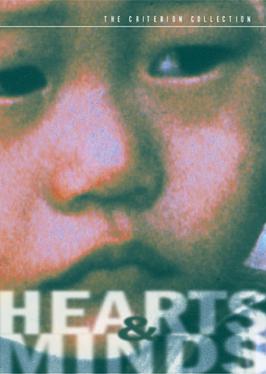The most famous documentary on the Vietnam War came out just months before the war ended. It premiered at Cannes. The director was Peter Davis. He was inspired by the release of the Pentagon Papers. It took him two years to make the film and he used over 200 hours of interviews. Some of the big names that refused to be interviewed were Richard Nixon and Henry Kissinger. One of the ones who did, National Security Adviser Walt Rostow, complained that his interview was misunderstood and this caused Columbia Pictures to back out on distribution. Warner Brothers agreed to take on the film. It appeared in theaters for one week to qualify for an Oscar. And it worked because it won the Best Documentary Film award. When co-producer Bert Schneider accepted, he read a letter from the head of the Viet Cong who offered friendship to the U.S. and thanked the anti-war protest movement. Later in the broadcast, Frank Sinatra read a statement by Bob Hope that disclaimed the letter.
The documentary leads off with a Vietnamese song. Position made clear. Next, we see peasants working in the fields and suddenly an American soldier walks past the camera. This is followed by the first interview. It is former Defense Secretary Clark Clifford. He offers the opinion that after WWII, America felt that its power could be used to control the future. Unstated was that a noncommunist Southeast Asia was part of that future. A newsreel explains the French involvement in French Indochina. Ike advances the domino theory and JFK talks about the light at the end of the tunnel. LBJ says success in Vietnam would depend on winning the “hearts and minds” of the Vietnamese people. The unabashed hawk Walt Rostow spouts the party line. Most Vietnamese did not want to be communists. We were there because South Vietnam was attacked and we were the only country that could save it. There are several segments starring returned POW George Coker. He is a patriot and does not regret participating in the war. It was his duty. My country right or wrong, but we weren’t wrong. Coker is balanced with several segments featuring Daniel Ellsburg. He summarizes each President’s involvement. There’s cool bombing footage matched with a peasant whose home was bombed. “First, they bomb as much as they please. Then they film.” William Fulbright points out that Ho Chi Minh thought we would support him when the Japanese left after WWII. “I lost seven kids to poison [Agent Orange].” They would take two Viet Cong up in a helicopter to interrogate them and then throw one out. Col. George Patton, Jr. lauds his men. “They’re a bloody good bunch of killers.” Hootches set on fire. The Tet Offensive section includes the Loan Execution (the film view, not the picture). The embassy attack. Westmoreland likens the offensive to the Battle of the Bulge - the enemy came out to fight and now we have them on the ropes. Vets throw their medals. Footage of the napalm girl.
This was one of the first things I videotaped when I got my VCR. I thought I might use it in my American History classes, but never did. (This was partly due to a scene in a brothel that has nudity. I cannot determine the reason for Davis’ inclusion of this scene since it would have limited who could see the film.) And I had not seen it in decades. I remembered the impact it had when it was released and I watched the Academy Awards when its Oscar caused a furor. Rewatching it for this review brought some surprises. First, it is nonlinear, which is very unusual for a documentary. It covers the greatest hits in the war, but not in order (as you can see from the previous paragraph). This was an artistic decision, but a poor one. The longevity of the film is diluted because anyone watching it today would need a good knowledge of the war to understand what is being referenced.
I was also surprised to find that it was more balanced than I remembered. It is clearly anti-war and you will leave it convinced the war was wrong. After all, that was the objective of Davis. However, there are interviewees that present the pro-war view. Rostow, Westmoreland, and Coker (not interviewed, but through speeches) are allowed to counter Ellsberg, Fulbright, and Clifford. Unfortunately for the hawks, there own words are discomforting. Westmoreland says that Orientals don’t value life like we do. This is matched with a woman distraught over the death of her husband. Coker tells a school assembly that the Vietnamese people are backwards and primitive and they made a mess of their country. These two examples show how a documentarian can manipulate his audience. Not that most veterans wouldn’t have agreed with Coker.
The star of the doc is Daniel Ellsburg. He has credibility since he had been a supporter of the war before he became one of the most famous anti-war figures with his release of the Pentagon Papers. Davis does not mention the Pentagon Papers or the controversy of their theft by Ellsburg. Sinatra and Hope would have known that, but how many Americans today would know the background? Anyone wanting to study the Vietnam War must see this film, but not first. Do your reading first. Then the movie will show important images from the war and provide voices from both sides of the conflict. It is not heavy-handed, especially when compared to other Vietnam War documentaries.
You can stream the movie on HBO Max or YouTube.
GRADE = B-

No comments:
Post a Comment
Please fell free to comment. I would love to hear what you think and will respond.